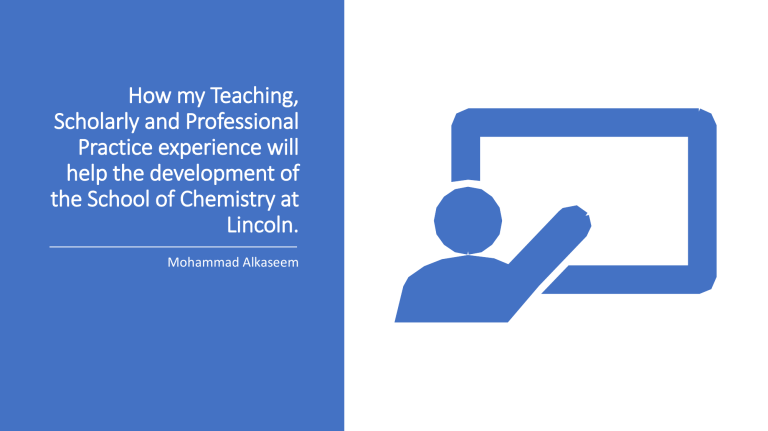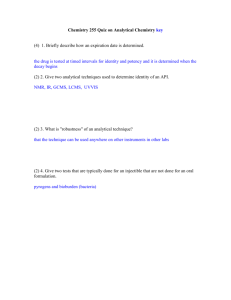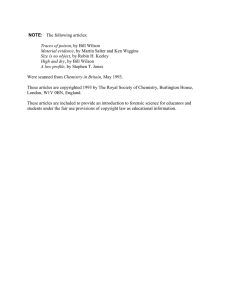
How my Teaching, Scholarly and Professional Practice experience will help the development of the School of Chemistry at Lincoln. Mohammad Alkaseem About me Graduated from Faculty of Pharmacy I started my teaching experience in 2000 at the Faculty of Pharmacy as an hourly paid lecturer. Then I completed my Diploma, MSc and PhD in Pharmaceutical Science at Damascus University. 1998–2000 1998 2000 Working in my own pharmacy (Alkaseem Pharmacy ) Professional Development 08/2018- now (part-time until 12/2018 then full time), Research Fellow, School of Computer Science, Lincoln University 08/2016- Present, Volunteer at Cara (the Council for At -Risk Academics 04/2018- 02/2019, visiting Researcher, School Chemistry, Lincoln University (Non-payment Contract) 10/2017- 10/2018 (part-time) Research Chemist in Crop Intellect Co, Lincoln, UK 02/2016- 02/2018, Postdoctoral Research Fellow (Cara Fellow), School Chemistry, Lincoln University (Forensic Science) 2015- 2016 (Full time) Lecturer of Instrumental Analysis and analytical chemistry, food chemistry in Arab International University, Damascus, Syria 2011- 2015 (Full time 09/2015) Lecturer and Scientific supervisor for the practical aspects, Department of Analytical and Food Chemistry, Faculty of Pharmacy, Syrian Private University, Damascus, Syria. 2000-2011 Teaching assistant, Department of Analytical Chemistry, Faculty of Pharmacy, University of Damascus, Damascus, Syria. Postdoc in Forensic Science ,visiting researcher in School of Chemistry , a multidisciplinary teaching approach • Analytical Chemistry / Separation Techniques/ Instrumental Analysis • Food Chemistry • Drug Analysis • Advanced Analytical Chemistry (Lincoln University) • Crime Scene Investigation (Lincoln University) • Fire Scene Investigation (Lincoln University) • drug of Abuse (Lincoln University) • Physiology (Lincoln University) • Forensic Science, nanoparticles, image analysis, toxicology (VOCs), Biology, bacteriology My research area is relevant to Forensic Science Publication based evidence • Modular assembly of proteins on nanoparticles, Nature Communications, (2018) 9:1489 • SERS and DFT study of 5F-PB-22, Journal of Raman spectroscopy, 08 July 2018 • Effects of bacteria on the yield and quality of spring barley, International Journal of Research in Agricultural Sciences (2018), 5, 5: 2348 – 3997 • There are more published , and more to publish soon - Biosensors (with Computer Science ) (Simon , Bashir) final revision by bashir - Biomarker from Cat’s Hair (Daniel , Tag) , final revision by Daniel - Mechanism of AgNPs (Mark) : last stage of experiments - SERS of 4 more synesthetic Cannabinoids (experiments completed ) Improvement • As All these modules are extremely relevant to Forensic Science, I have a broader view of how this will need to fit with Professional Practice in Forensic Science. • This will help in improving teaching skills in different areas of Forensic Science. and will have a positive impact on teaching material (for example; validation and quality tools for professional practice) Teaching and assessment • I have undertaken many staff development opportunities in teaching, assessment, student engagement and support to develop my teaching skills and to link myself with current teaching strategies. • One of my greatest objectives in teaching is to provide a safe and interactive learning environment in my sessions and to use modern teaching tools to bring fun to the content-heavy science lectures. I gradually learnt how to enhance student creativity and personal development, using different teaching/learning techniques. I also learned to appreciate how important the feedback you get from your mentors is; I realized that feedback is the backbone of learning development in teaching. Student engagement is important in measuring the education quality and the effectiveness of educational policy • Example ; Instrumental Analysis, 3h/week for16 week • maximize the student engagement through group discussion • PowerPoint slides • Short videos to enrich the lecture notes • Most importantly, student activities (short presentations, posters ..) • My materials are available in advanced through Logos (Black board) • Efficiency and performance; Student pass their experience to each other (I give them chance to be teacher) Qualitatively better learning • Enhance the student reading, research, time management and writing skills (my material are available on Logos ) • I believe that assessment drives learning • Formative assessment/summative assessment • Feedback; one-to-one or group session • Exams • I tend to use short answer and multiple choice questions in the first year exams , and use deep learning for higher levels • • Whilst in the Faculty of Pharmacy, I have been involved in designing separation techniques, drug analysis modules • Required; • Research skills • Student variations • Risk Assessment • Ethical issues • Example from my experience; • In Separation Techniques, DNA extraction and purification??It is important BUT Ethical issues is serious. Designing Material; Whilst in the Faculty of Pharmacy, I have been involved in designing separation techniques, drug analysis modules • Required; • Research skills • Student variations • Risk Assessment • Ethical issues • Example from my experience; • In Separation Techniques, DNA extraction and purification??It is important BUT Ethical issues is serious. • This strategy will help maintaining a focus on sticking to the agreed outcomes of the involved modules and aligning with the assessment requirements Competent and self-dependent in Wide Range of Analytical Instruments → Flexibilty for undergraduate projects • • • • • • • • • • HPLC (Knaur , and Shimadzo models ) GC-MS (Shimadzo with Gcsolution) UV-Vis spectrophotometer (Jasco v530, Jenway, Shimadzo, ..) FTIR (Bruker , OPUS / Spectrum 100) Circular Dichriosm (Applied Photophysics, Pitar) Dynamic Light Scattering (Zetasizer/Malvern) Nanoparticle Tracking Analysis (NTA) Raman Spectroscopy (Horiba LabRam) Separation techniques ; LLE, HS, SPE, SPME, TLC, CC, PE, GE Electrochemistry, ISE, Potentiometry • • • • • • • • • • • • • Curriculum development Ability to support students Good organisation Projects Team working




